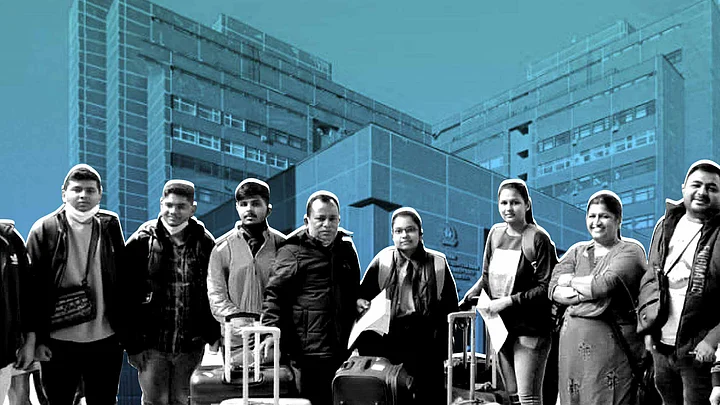No one from the Indian Embassy reached out to stranded Indian students in Kharkiv, alleged the anguished father of Naveen, a young medical student who on Tuesday sadly became the first Indian citizen to be killed in the devastating Russian military offensive on Ukraine.
That is a pathetic reflection on the Indian diplomatic mission in Ukraine, which wound up its operations in Kyiv and is relocating in Lviv, near Ukraine’s western border. Not only have they done little except issue advisories to stranded Indians, but they also have not reached out to anyone and appear unaware of how many Indians have left that country in two weeks, since they first issued an advisory on 15 February. The Ministry of External Affairs (MEA) spokesman said on February 28, “We don't exactly know how many left between the advisory and [when] the conflict started. We think around 8,000 citizens have left.”
India's Ineffectual Diplomatic Positioning
Clearly late in reacting to escalating tensions between Ukraine and Russia, despite weeks of Western intelligence reports suggesting an imminent attack on Ukraine, Ambassador Partha Satpathy and his diplomatic staff are missing in action. And Indians, particularly students, face the brunt of India’s diplomatic positioning and ineffectual diplomatic posturing.
Thousands of Indians, mostly medical students, remain in Kharkiv, and their safe evacuation is now the focus of Indian efforts, after a student died. It is shocking that despite issuing advisories to students to move to railway stations and other borders as they desperately try to leave the country, Satpathy and his diplomatic staff appear AWOL. The Indian envoy has not been like the legendary king Bhagirath, who brought the Ganga down to earth to release his people from the curse of Kapil ‘muni’ (sage).
And therein lies another tale. What purpose is served by naming a mission to evacuate stranded Indians out of a war zone as ‘Operation Ganga?’ Perhaps motivated by and coinciding with the auspicious ‘Shivratri’, Prime Minister Narendra Modi, following the example of Lord Shiva, decided to despatch his ministers to control and guide the flow of Indians leaving Ukraine.
Since the launch of ‘Operation Ganga’ on 25 February, nearly 2,000 have returned to India. The Indian Air Force has now been pressed into service to expedite the process of bringing Indians back.
Unfortunately, neither the IAF nor ‘special envoy’ ministers will enter Ukraine, which is under heavy attack with its airspace closed. Jyotiraditya Scindia was bound for Romania and Moldova, Kiren Rijiju headed to Slovakia, former diplomat and now Minister Hardeep Puri departed for Hungary, and General (retd) V.K. Singh headed to Poland.
Ukrainians are Disappointed
But Indians trying to leave Ukraine are facing acute problems and hardship, even discrimination, within Ukraine. The anger and racism they have encountered is a sad reality, less to do with themselves and more to do with the position India has adopted on the conflict and articulated at international forums.
India abstained from voting on a resolution to censure Russia for its aggression at the United Nations Security Council on Friday. This was after Russian troops had entered Ukraine. It abstained again on Sunday from a procedural vote in the UN Security Council seeking a rare emergency session of the UN General Assembly to censure Russian aggression. This has not been well-received in the besieged Ukraine.
That India chose to abstain and not authorise a move to criticise Russia in the UNGA, despite a veiled threat of use of nuclear power by Russian President Vladimir Putin, has deeply disappointed Ukrainians. Ukrainian President Volodymyr Zelenskyy had, in a telephonic conversation with Modi, specifically requested political support for Ukraine at the United Nations.
Reports from across Ukraine, including the capital city Kyiv, suggest that Indian students are being bypassed in their efforts to board trains to leave the country, and some are facing violence from angry Ukrainian border guards.
The Indian embassy issues advisories, students said, but no personnel are on hand to help en route or at exit points. The MEA has deputed staff at border crossings with five countries neighbouring Ukraine, but students walking and waiting for days in bitter, cold conditions, pushed around and deboarded from trains, have found no assistance.
'Fairweather Friends'
Former diplomats contrast this response with Ambassador M. Manimekalai, who, as India’s Ambassador to Libya, personally travelled to Sirte in the war zone in 2011 to evacuate Indians stranded in Libya, amid European airstrikes to end Muammar Gaddafi’s regime. She personally supervised the Herculean operations and ensured that 16,000 Indians were evacuated safely.
Ambassador Ausaf Sayeed in Yemen, and earlier Ambassador Nengcha Louvhum in Lebanon and Ambassador Suresh Reddy in Iraq, are all stellar examples available to emulate. Around 1,70,000 Indians were evacuated from Kuwait in 1990, with minimal fuss. No roses were offered nor photo-ops with ministers available on arrival. These issues were not raised as provincial election campaign material. And, most importantly, no Indians died.
Students who have managed to leave Ukraine and return safely said they would be better served if they got help and accurate instructions to navigate within the war-torn country.
The MEA said top leaders had been working the phones to get Indians safe passage out of Ukraine. But the tragic death of a student and the behaviour meted out to many Indians indicates that leadership-level talks, with leaders of the warring countries and their neighbours, has not really helped the Indians braving enormous odds to return to India.
There is even a growing perception among local Ukrainians that Indians are ‘fairweather’ friends who did not stand by them in need. All of this could further complicate an already fraught situation.
(Nilova Roy Chaudhury, a senior journalist, is Consulting Editor with India News Stream and a Senior Fellow with think tanks WISCOMP (Women in Security, Conflict Management and Peace) and Society for Policy Studies. This is an opinion article and the views expressed are the author's own. The Quint neither endorses nor is responsible for them.)
